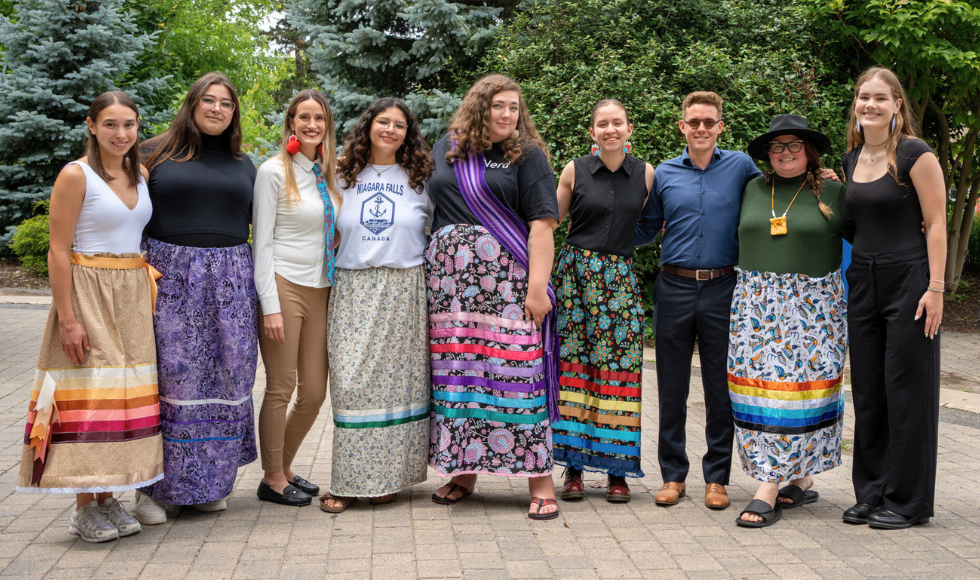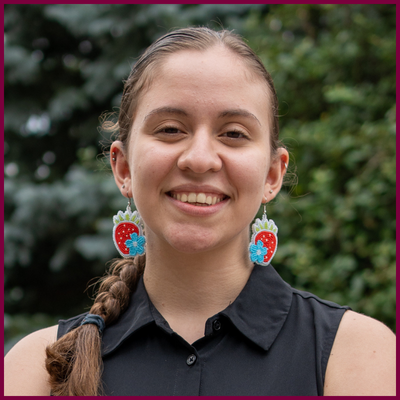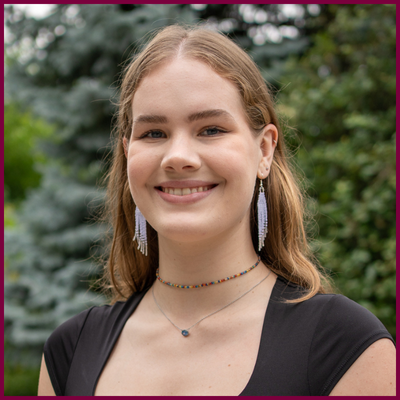IndigiNerds Program marks another year of inspiring the next generation of Indigenous scholars

The 2024 IndigiNerd cohort (from left to right) Emma Robertson, Kate Lariviere, Laura Couchie, August Kindla, Faith Trottier, Darci Debassige, Gareth-John Martin, Peyton Meters, Maddy Lutes and Emily Granville (not pictured). (All photos by Abdo Habbani/McMaster University).
Ten Indigenous undergraduate students from across Canada got the chance to experience a taste of graduate student life, being immersed in a unique research experience through a program hosted by the McMaster Indigenous Research Institute (MIRI).
The program, IndigiNerds (formerly the Indigenous Undergraduate Summer Research Scholars program), is an eight-week long intensive program where students contribute as research scholars under the supervision of a McMaster faculty member.
IndigiNerds also participate in workshops, Indigenous Knowledge programming, and social and cultural activities.
The program, now having concluded its ninth cycle, allows participants to benefit from mentorship and guidance, ultimately allowing them to make more informed choices about graduate studies.
“We are proud to have helped build many, many meaningful and trusted connections between participants and Indigenous scholars,” says Sara Howdle, assistant director of MIRI. “These connections, and the lessons learned through the program, have inspired our IndigiNerds to go on and become the next generation of Indigenous scholars.”
Learn more about three members of this year’s cohort and the research they undertook as part of the program:
Darci Debassige

Debassige, who is Anishinaabe from M’Chigeeng First Nation, used her time in IndigiNerds to explore the experiences of Indigenous women, girls and gender diverse individuals in relation to their sexual and reproductive health and rights, and HIV care.
The McMaster Psychology, Neuroscience & Behaviour student, who is specializing in mental health and pursuing a minor in Indigenous studies, worked under the supervision of physician Mona Loutfy, an infectious disease specialist with the Feast Centre for Indigenous STBBI Research.
Debassige says she was unsure what to expect heading into the program because her previous research experience was limited, but says she now feels prepared to take on an upcoming research assistant position and to pursue a fourth-year thesis.
She says she is grateful for the support she was given from both MIRI staff and her cohort. “It’s refreshing as an Indigenous student — which can often be an isolating experience — to be with people who are going through the same thing,” she says.
Debassige says she is still figuring out what she will do after she completes her undergraduate degree, but that she is grateful to have learned about all the options available to her. “It has definitely made that picture so much clearer,” she says.
Her favourite moment from the program? Canoeing with her fellow IndigiNerds on the Grand River.
Maddy Lutes

Maddy Lutes says she feels proud to have played a role in a research project that will have a longstanding impact on northern communities affected by climate change.
A student in McMaster’s School of Earth, Environment & Society, Lutes worked under the supervision of McMaster Professor Gita Ljubicic, who is the Canada Research Chair in Community-Engaged Research for Northern Sustainability. Lutes examined disparities between research proposals from Nunavut-based research groups, and from non-Nunavut — and largely southern community — research groups.
Lutes’ work will fit into a larger research project aimed at creating a database that will allow communities in Nunavut to learn about and access research being done on their land.
“It is very fulfilling to know that it adds to an even bigger project that will make life easier for thousands of people,” she says.
Lutes will also continue her research this summer before heading back to school, thanks to a new scholarship through a partnership between IndigiNerds and the Canadian Cancer Society.
Lutes says she was encouraged to join IndigiNerds by Ljubicic, and her experience in the program helped her decide to pursue a thesis under Ljubicic’s supervision in the future.
Her favourite memory from the program? Receiving teachings from Elders who came to speak to the cohort. “It’s irreplaceable knowledge,” says Lutes. “It makes me reflect deeper than I’ve been able to on my own. I’m very grateful.”
Emma Robertson

Emma Robertson, who is heading into her final year of McMaster’s Bachelor of Health Sciences program, intends to apply for medical school but wanted to take IndigiNerds to assess all her options at the graduate studies level.
“The program has given me the space to explore research and to look into how graduate studies really work and how I can integrate that into my future goals,” says Robertson.
Robertson, who is from the Red Rock Indian Band and grew up in North Bay, conducted research under the supervision of Jennifer Walker, an associate professor in the Department of Health Research Methods, Evidence & Impact.
Robertson’s work was part of a larger project to develop culturally safe brain health assessment tools for community partners to use for dementia prevention, diagnosis and care in Indigenous populations.
A key thing she learned about research? “It’s not always a linear path,” says Robertson. “The research can really evolve, and you need to really be open to that and go in the direction that the research leads you in.”
Her favourite memory from the program? Getting to know the other members of her cohort. “It’s been really great to spend time with everyone and to have that community.”
View this post on Instagram
To learn more about the IndigiNerds program, visit the MIRI website


